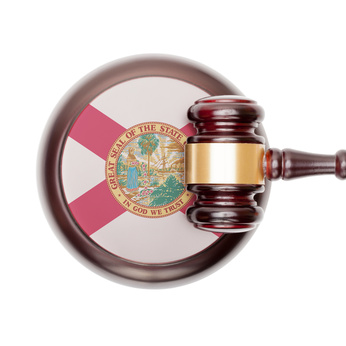The Third District Court of Appeal, State of Florida, recently reversed the dismissal of a mortgage foreclosure action based on the mortgagee’s failure to provide the name of the corporate representative who was to testify at trial, holding that dismissal was an overly harsh sanction given that no prejudice was shown. A copy of the opinion in Deutsche Bank Nat’l Trust Co. v. Perez, et al. is available at: Link to Opinion. In October 2009, the trustee of a mortgage-backed securities trust sued to foreclose a mortgage on real property in Miami-Dade County, Florida. In October 2014, the case was set for…
Posts published in “Foreclosure”
The District Court of Appeal of the State of Florida, Fifth District, recently reversed an involuntary dismissal of a mortgage foreclosure action, holding that the trial court erroneously ruled that the mortgagee failed to comply with the mortgage’s pre-foreclosure notice requirements, and erroneously excluded from evidence the prior loan servicer’s business records. A copy of the opinion in The Bank of New York v. Johnson is available at: Link to Opinion. A borrower defaulted on her mortgage and the mortgagee sued to foreclose. The foreclosure action proceeded to a non-jury trial, at which an employee of the mortgage servicer testified about the process…
In a case limited to nonjudicial foreclosures, the Supreme Court of California recently held that a borrower may maintain an action for wrongful foreclosure based on an allegedly void assignment. More specifically, the Court held that, “because in a nonjudicial foreclosure only the original beneficiary of a deed of trust or its assignee or agent may direct the trustee to sell the property, an allegation that the assignment was void, and not merely voidable at the behest of the parties to the assignment, will support an action for wrongful foreclosure.” The Court clarified that: “[w]e hold only that a borrower…
The District Court of Appeal of the State of Florida, Fourth District, recently affirmed a final judgment of foreclosure in plaintiff mortgagee’s favor, holding that the plaintiff mortgagee was not required to send a second notice of default after it voluntarily dismissed its first foreclosure action before filing the second foreclosure action. A copy of the opinion in Michael E. Sill a/k/a Michael Sill v. JPMorgan Chase Bank, National Association is available at: Link to Opinion. In April 2007, the borrower signed a promissory note and mortgage securing the loan, but defaulted on July 1, 2009. Pursuant to paragraph 22 of the mortgage, the mortgagee sent…
The U.S. Court of Appeals for the Ninth Circuit recently held that, under California law, a two-year delay in failing to investigate the facts entitling a party to rescind a foreclosure sale transaction barred that equitable remedy, even though there was a genuine issue of material fact as to whether the plaintiff foreclosure buyer could have discovered material defects before the foreclosure sale. A copy of the opinion in DM Residential Fund II v. First Tennessee Bank is available at: Link to Opinion. A mortgagee (“lender”) initiated a non-judicial foreclosure of residential real estate in California, and sold that property at a foreclosure sale to…
The District Court of Appeal of the State of Florida, Fourth District, recently affirmed the dismissal of a mortgage foreclosure action because the mortgagee failed to present competent, substantial evidence that it had standing to foreclose, due to lack of conformity between the name of the plaintiff mortgagee and the names in the transactional documentation by which the plaintiff mortgagee claimed an interest in the note at issue. A copy of the opinion in Bank of New York Mellon Trust Company, N.A. v. Dennis M. Conley, et al. is available at: Link to Opinion. A mortgagee filed a foreclosure action. The promissory note contained…
The U.S. Court of Appeals for the Sixth Circuit recently held that a bankruptcy court clearly erred in its finding that a debtor proposed a Chapter 11 plan in good faith, when the secured mortgagee would be paid only in part and very slowly after 10 years with no obligation by the debtor to maintain the building and obtain insurance, while a second class would be paid in full in two payments of $1,200 each over 60 days. In so ruling, the Sixth Circuit held that the artificial creation of an “impaired” class under section 1124(1) of the Bankruptcy Code,…
The District Court of Appeal of Florida, Second District, recently held that a notice of assignment of a mortgage loan pursuant to the Florida Consumer Collection Practices Act (FCCPA) is not a condition precedent to filing a mortgage foreclosure action, but certified the question to the Florida Supreme Court for resolution as one of great public importance. A copy of the opinion in Brindise v. U.S. Bank National Association is available at: Link to Opinion. Husband and wife borrowers obtained a mortgage loan in 2005, which was later transferred to a new holder via “blank endorsement,” which under section 673.205(2) of Florida’s…
The District Court of Appeal of Florida, Second District, recently reversed a trial court’s order vacating a voluntary dismissal based on mistaken advice from counsel regarding the statute of limitations, holding that the voluntary dismissal was the result of a deliberate judgment by counsel, and not the type of non-judgmental, clerical mistake that Florida law recognizes as a basis to undo a voluntary dismissal. A copy of the opinion in Cottrell v. Taylor, Bean & Whitaker Mortgage Corp. is available at: Link to Opinion. In March 2013, borrowers created a land trust, naming their attorney as trustee. They then transferred to the…
The U.S. Court of Appeals for the Sixth Circuit recently rejected a borrower’s “robo-signing” challenge to his foreclosure. In so ruling, the Court also held that a Michigan state court’s issuance of a preliminary injunction against a mortgagee in a foreclosure action did not bar subsequent removal and entry of summary judgment in favor of the mortgagee by a federal district court. A copy of the opinion in Burniac v. Wells Fargo Bank, NA is available at: Link to Opinion. The borrower obtained a mortgage loan, and the mortgage was later assigned. The new mortgagee continued to send the borrower his monthly…
The Third District Court of Appeal, State of Florida, recently reversed a trial court’s dismissal of foreclosure proceedings due to a ruling that a lost note was not properly re-established, holding that the trial court should have entered judgment for the plaintiff mortgagee because the plaintiff mortgagee met the statutory requirements for re-establishing the lost note, and because the trial court admitted business records without objection into evidence showing the note was in default. A copy of the opinion in Nationstar Mortgage, LLC v. Marquez, et al. is available at: Link to Opinion. The borrower signed a note and mortgage in…
The U.S. Court of Appeals for the Sixth Circuit recently confirmed that a servicer and loan owner who did not bring a debt collection or foreclosure action as a counterclaim to a federal Fair Debt Collection Practices Act (FDCPA) lawsuit did not waive their ability to collect on the debt in the future. A copy of the opinion in Bauman v. Bank of America, NA is available at: Link to Opinion. In August 2004, the borrowers obtained a loan and executed a note to purchase property. The note was secured by a mortgage on the property. Later that year, the loan was…












